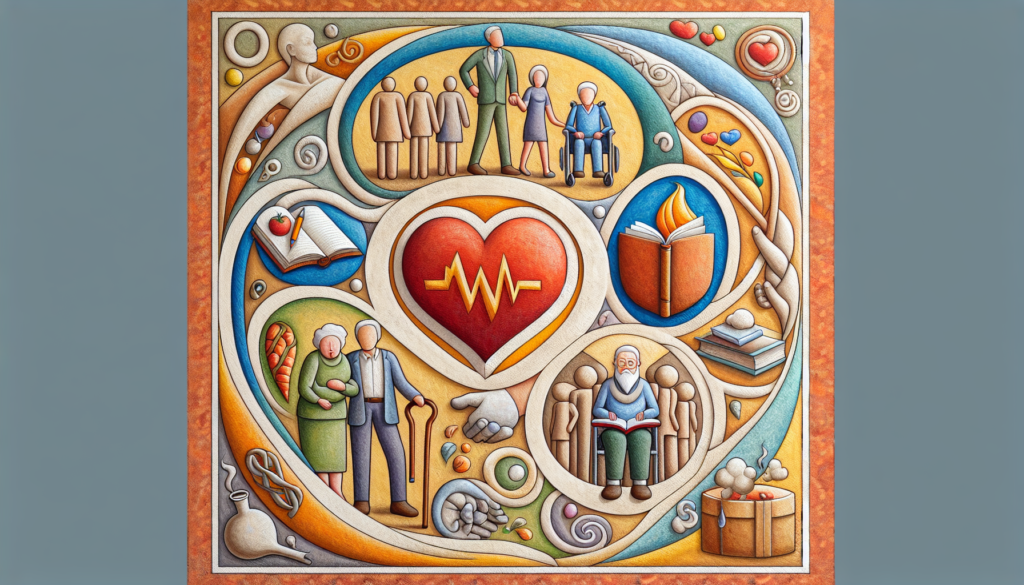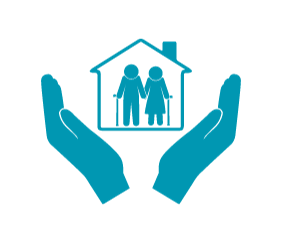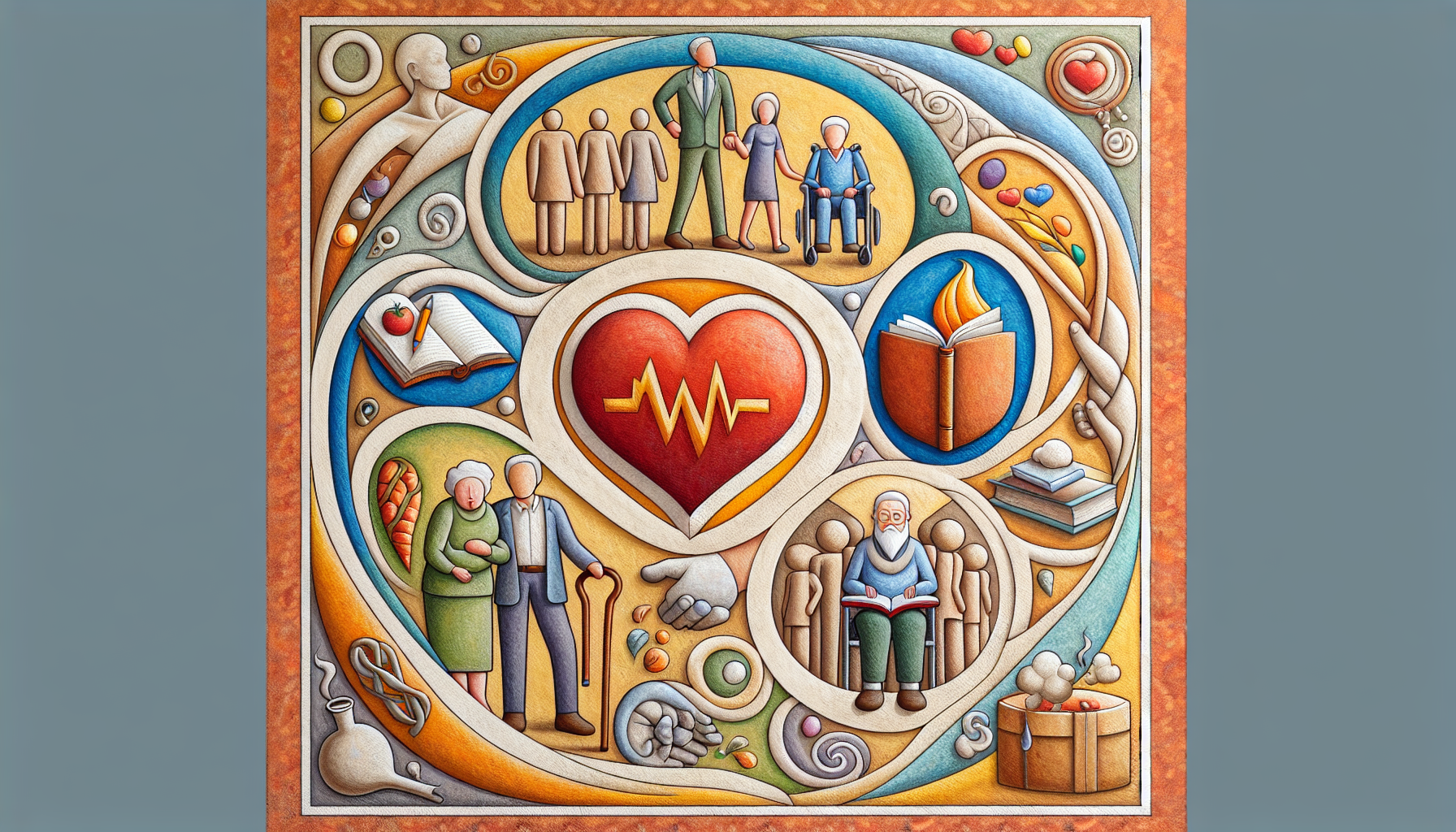As we age, our needs change, and it’s essential to understand what seniors require to live a fulfilling and comfortable life. From companionship and social interaction to quality healthcare and assistance in daily activities, seniors need a wide range of support to thrive. This article explores the various aspects of senior care, highlighting their need for love, care, and opportunities to maintain their independence and overall well-being. Whether it’s physical, emotional, or social support, understanding and meeting the needs of our seniors is crucial for ensuring a happy and healthy aging process.

Physical Health
Exercise
Ensuring regular exercise is an essential aspect of senior care. Exercise helps maintain physical fitness, prevents numerous health conditions, and improves overall well-being. Engaging in activities like walking, swimming, or yoga can help seniors stay fit and maintain their mobility.
Nutrition
Proper nutrition plays a vital role in seniors’ overall health. Encouraging a well-balanced diet rich in fruits, vegetables, lean proteins, and whole grains is crucial. Adequate hydration is also important for maintaining good health, so seniors should be encouraged to drink plenty of water throughout the day.
Medical Care
Regular medical check-ups are crucial for seniors to identify and address any health concerns. Routine screenings for blood pressure, cholesterol levels, and chronic conditions like diabetes can help manage these issues effectively. It is important to ensure seniors have access to quality medical care and that they are aware of the available resources and healthcare providers in their area.
Mobility Aids
Mobility aids, such as canes, walkers, or wheelchairs, can greatly enhance seniors’ independence and quality of life. These aids help seniors move around safely and comfortably, reducing the risk of falls and injuries. It is important to assess seniors’ mobility needs and provide the appropriate aids to support their mobility and ensure their well-being.
Emotional Well-being
Socialization
Maintaining an active social life is crucial for seniors’ emotional well-being. Connecting with family and friends, participating in community activities, and joining senior centers can provide opportunities for social interactions. Socialization helps combat feelings of loneliness and isolation, promoting mental and emotional wellness.
Mental Health Support
It is important to address seniors’ mental health needs and provide them with necessary support. Offering counseling services, therapy, or support groups can help seniors cope with mental health challenges such as depression or anxiety. By prioritizing mental health, seniors can enjoy a higher quality of life and emotional well-being.
Coping with Loss
As seniors face the loss of loved ones or experience major life changes, it is important to provide them with resources to cope with grief and loss. Grief counseling or support groups can offer a safe space for seniors to express their emotions, receive support, and learn healthy coping mechanisms. Helping seniors navigate the grieving process is crucial for their emotional well-being.
Meaningful Activities
Engaging in meaningful activities can provide seniors with a sense of purpose and fulfillment. Hobbies, volunteer work, or artistic pursuits can keep seniors mentally stimulated and emotionally fulfilled. Providing opportunities for seniors to pursue activities they enjoy is essential for their emotional well-being and overall happiness.
Financial Security
Pension Benefits
Ensuring seniors have access to their entitled pension benefits is crucial for their financial security. Understanding the pension system and helping seniors navigate the process is important to ensure they receive the financial support they need during their retirement years.
Affordable Housing
Having access to affordable housing options is vital for seniors’ financial security. Affordable housing programs or senior living communities that offer reduced rent or affordable housing options can help alleviate financial burdens and provide seniors with a safe and comfortable place to live.
Estate Planning
Encouraging seniors to engage in estate planning can provide them with peace of mind and protect their assets and wishes. Estate planning allows seniors to name beneficiaries, create a will, and make decisions regarding their healthcare and financial matters. Seeking legal advice in estate planning ensures seniors’ assets are distributed according to their wishes, minimizing the stress for their loved ones.
Fraud Prevention
Seniors can be more vulnerable to financial scams and fraud. Providing education and resources on fraud prevention is essential to protect seniors from financial exploitation. Educating seniors about common scams, emphasizing the importance of safeguarding personal information, and encouraging them to seek advice before making any financial decisions can help ensure their financial security.

Social Support
Family and Friends
Maintaining strong relationships with family and friends is crucial for seniors’ social support. Encouraging regular communication and organizing family gatherings can help seniors feel connected and supported. Strengthening existing bonds and fostering positive relationships can greatly enhance seniors’ overall well-being.
Community Programs
Community programs tailored for seniors provide opportunities for social engagement and support. These programs can include various activities, classes, or events designed to meet seniors’ needs and interests. Engaging in community programs allows seniors to connect with others who share similar experiences and interests, fostering a sense of belonging and social support.
Support Groups
Joining support groups can provide seniors with a safe space to share their experiences, seek advice, and receive support. Support groups often focus on topics such as health conditions, grief and loss, or caregiving, allowing seniors to connect with others who understand their challenges. Participating in support groups can help seniors feel understood and supported, enhancing their overall well-being.
Volunteer Work
Engaging in volunteer work can be incredibly rewarding for seniors, providing them with a sense of purpose and fulfillment. Volunteering opportunities allow seniors to contribute to their community, utilize their skills and expertise, and make a positive impact on others’ lives. Volunteering also offers social interactions and networking opportunities, fostering a sense of belonging and social support.
Accessible Transportation
Public Transport
Accessible public transportation options are crucial for seniors to maintain their independence and access essential services. Public buses or trains equipped with ramps and designated seating for seniors and people with disabilities ensure that transportation remains accessible and convenient for all.
Senior Shuttle Services
Senior shuttle services provide door-to-door transportation for seniors, catering specifically to their needs. These services offer a reliable and safe way for seniors to get around, especially for medical appointments, grocery shopping, or social outings. Senior shuttle services ensure that transportation remains accessible and convenient, empowering seniors to maintain their independence.
Ridesharing Apps
Ridesharing apps, such as Uber or Lyft, can provide convenient transportation options for seniors. These apps enable seniors to request a ride with just a few taps on their smartphone, ensuring they can travel to their desired destinations without the need for driving or relying on public transportation. Ridesharing apps offer flexibility and convenience, enhancing seniors’ mobility and independence.
Wheelchair Accessible Vehicles
For seniors who rely on wheelchairs or mobility scooters, having access to wheelchair-accessible vehicles is essential. These vehicles are designed to accommodate mobility aids, allowing seniors to travel comfortably and safely. Ensuring the availability of wheelchair-accessible vehicles enables seniors with mobility challenges to participate fully in society and maintain their independence.
Safety and Security
Home Security Systems
Installing home security systems can provide seniors with peace of mind and enhance their safety. These systems offer features such as alarms, motion sensors, and surveillance cameras to protect seniors’ homes from potential intrusions or emergencies. Home security systems contribute to a safe living environment, allowing seniors to age in place with increased security.
Emergency Response Systems
Emergency response systems, such as medical alert devices or personal emergency response systems, ensure that help is readily available in case of emergencies. These devices allow seniors to call for assistance with the press of a button, connecting them to a professional monitoring center or contacting designated emergency contacts. Emergency response systems provide seniors with a sense of security and prompt help in critical situations.
Fall Prevention Measures
Implementing fall prevention measures within seniors’ homes and communities is essential for their safety. This can include installing grab bars in bathrooms, removing tripping hazards, and improving lighting. Regular exercise programs focused on improving balance and strength can also help reduce the risk of falls. Fall prevention measures safeguard seniors’ well-being and prevent injuries.
Medical Alert Devices
Equipping seniors with medical alert devices ensures they can quickly summon help in medical emergencies. Medical alert devices are wearable gadgets that allow seniors to send distress signals when they require immediate medical assistance. These devices provide seniors with a sense of security and enable quick responses in critical situations.
Quality Healthcare
Regular Check-ups
Regular check-ups with healthcare professionals are essential for seniors to monitor their health and detect any potential issues early on. These check-ups include routine physical examinations, vaccinations, and screenings for various conditions. Ensuring seniors have access to regular healthcare assessments is crucial for maintaining their overall well-being.
Access to Specialists
Access to specialists allows seniors to receive specialized care tailored to their specific health needs. Whether it is consulting with a cardiologist, geriatrician, or neurologist, ensuring seniors can access the expertise of specialists is vital. Specialists can provide seniors with comprehensive care and address specific health concerns effectively.
Medication Management
Proper medication management is crucial for seniors’ health and well-being. Seniors often take multiple medications, and managing them can be challenging. Encouraging seniors to utilize medication management tools like pill organizers or smartphone reminders can help them stay organized and take their medications as prescribed. Regular medication reviews by healthcare providers also ensure that seniors’ medications are appropriate and safe.
Home Healthcare Services
For seniors who have difficulty accessing healthcare facilities or require specialized care, home healthcare services offer a valuable solution. Home healthcare professionals provide medical care, therapy, and support services in the comfort of seniors’ homes. These services allow seniors to receive the care and assistance they need while remaining in their familiar environment.
Memory Care
Dementia-friendly Environments
Creating dementia-friendly environments is vital for seniors affected by memory loss conditions like Alzheimer’s disease. Designing spaces with clear signage, avoiding complex patterns, and ensuring adequate lighting can minimize confusion and support cognitive function. Dementia-friendly environments contribute to seniors’ well-being and help them maintain their independence.
Memory-enhancing Activities
Engaging in activities that stimulate memory and cognition is beneficial for seniors with memory loss conditions. Puzzles, memory games, or music therapy can help improve memory recall and cognitive abilities. Offering a variety of memory-enhancing activities tailored to seniors’ preferences can help slow down memory decline and boost their overall well-being.
Supportive Caregivers
Seniors with memory loss conditions require compassionate and supportive caregivers who understand their unique needs. Providing caregivers with adequate training and resources is essential for delivering high-quality care. Supportive caregivers contribute to seniors’ emotional well-being and ensure their safety and comfort.
Assistive Technology
Using assistive technology can greatly enhance the independence and quality of life for seniors with memory loss conditions. Smart home devices, medication reminders, and GPS tracking devices can help seniors manage daily tasks and stay safe. Using assistive technology allows seniors with memory loss to age in place with improved autonomy.
Independence and Autonomy
Home Modifications
Making necessary home modifications is crucial for seniors to maintain their independence and safety. Installing grab bars, ramps, or stairlifts can improve accessibility and reduce the risk of falls. Adapting the home to seniors’ needs allows them to continue living independently while minimizing potential hazards.
Assistive Devices
Assistive devices, such as hearing aids, walking aids, or talking clocks, can greatly enhance seniors’ independence and autonomy. These devices compensate for any sensory or mobility limitations and enable seniors to perform daily tasks with ease. Identifying and providing the appropriate assistive devices empowers seniors to live independently and confidently.
Personal Care Assistance
For seniors who require support with activities of daily living, personal care assistance is crucial. Assistance with bathing, dressing, or meal preparation enables seniors to maintain their hygiene and nutritional needs. Access to reliable personal care assistance helps sustain seniors’ independence and improves their overall quality of life.
Accessible Recreation
Providing seniors with accessible recreational opportunities allows them to stay active and engaged. Accessible parks, recreational centers, or sports activities ensure that seniors of all abilities can participate in social and recreational activities. Accessible recreation fosters inclusivity and enables seniors to continue enjoying hobbies and leisure pursuits.
Educational Opportunities
Lifelong Learning Programs
Lifelong learning programs offer seniors the opportunity to expand their knowledge and pursue intellectual interests throughout their retirement. These programs can include adult education classes, workshops, or lectures on a wide range of topics. Lifelong learning promotes mental stimulation, personal growth, and social interaction among seniors.
Senior Centers
Senior centers often provide various educational programs and resources tailored for seniors. These centers offer classes, workshops, and seminars on topics such as computer literacy, art, language learning, or financial planning. Senior centers serve as valuable hubs for seniors to engage in educational opportunities and connect with their peers.
Online Courses
Online courses provide seniors with flexible and accessible educational opportunities. Platforms like Coursera or Udemy offer a wide range of courses on various subjects that can be accessed from the comfort of home. Online courses enable seniors to pursue learning at their own pace and cater to their specific interests.
Intergenerational Exchanges
Facilitating intergenerational exchanges allows seniors to share their knowledge and experiences while benefiting from the insights and perspectives of younger generations. Programs that connect seniors with children or young adults, such as mentoring or volunteering in schools, create a positive environment for learning, fostering mutual respect and understanding across generations.
In conclusion, seniors have diverse needs across various aspects of their lives. By addressing their physical health, emotional well-being, financial security, social support, accessible transportation, safety, healthcare, memory care, independence, and educational opportunities, we can ensure seniors lead fulfilling and meaningful lives as they age. With a comprehensive and person-centered approach to senior care, we can provide the necessary support and resources to meet seniors’ needs and enhance their overall well-being.


